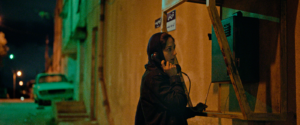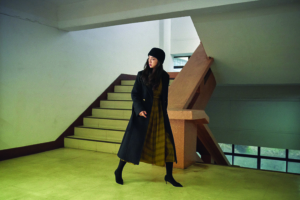Maryam (Mila Al Zahrani) is a rarity in rural Saudi Arabia: a female doctor. Tired of provincial life, and the scepticism and sexism that greets her on a daily basis (like the male patients who refuse emergency treatment from her based solely on her gender), she dreams of getting a job at a big hospital in cosmopolitan Riyadh. Her plan is to fly to a medical conference in Dubai, meet the men in power and convince them that she’s worthy of being granted an appointment. Fate seems to smile on her when, at the airport, she bumps into the conference’s keynote speaker (Muhammad Shaman), an important surgeon from the Saudi capital. Maryam approaches him, talks herself up and eventually declares, ‘I’m sure I’d be the perfect candidate!’
This line proves fateful, but not in the way she expects. Tragicomic quirks of circumstance – regarding an expired travel permit, the requirement of a male relative’s permission and a family member who works as a local political big shot – find Maryam filling out the paperwork to apply to be a member of the municipal council. She does it just so she can talk to her distant cousin Rashid (Ahmad Alsulaimy), in the hope that he can get her travel permit renewed; but after she fails to make it to Dubai, she channels her frustration into her unlikely new pursuit. Angry that the unpaved thoroughfare to the local hospital has turned into a mud heap due to a burst water main, Maryam makes the much-needed roadworks her central campaign issue. When she appears on a local morning TV show, they frame her solely as a ‘women’s candidate’ and condescendingly ask if she’s most concerned with the building of parks and playgrounds. No, Maryam counters, she’s an ER doctor with an interest in municipal works on a larger level; she’s running ‘to make a change in our community, whether it’s fixing the road or changing our old-fashioned, sometimes negative mindset’. Her candidacy is, of course, a duly symbolic tale of female agency in Saudi Arabia, a country undergoing rapid social change but still under the shadow of old hardline conservative Islamic edicts.
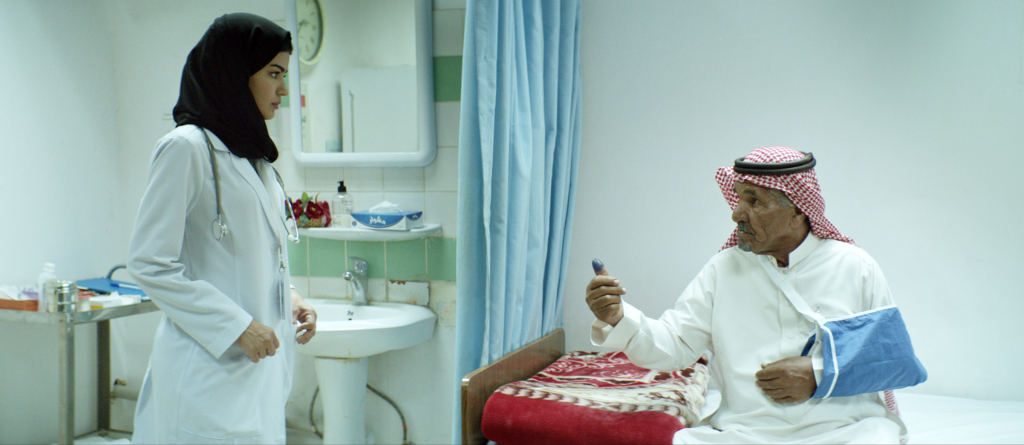
‘It is a good time to tell a story about women embarking in politics,’ says Haifaa Al Mansour, the director of the film in which all of this transpires, The Perfect Candidate (2019). ‘It’s a story that women everywhere in the world have: it’s difficult to assert themselves as leaders and see if the general public will elect them and believe in them.’[1]Haifaa Al Mansour, quoted in Orla Smith, ‘TIFF Interview: Haifaa Al-Mansour on Her Political Crowdpleaser, The Perfect Candidate’, Seventh Row, 27 September 2019, <https://seventh-row.com/2019/09/27/haifaa-al-mansour-perfect-candidate/>, accessed 19 May 2021. One need only recall the horrors of the 2016 US Election[2]See Tamara Keith, ‘Sexism Is Out in the Open in the 2016 Campaign. That May Have Been Inevitable’, NPR, 23 October 2016, <https://www.npr.org/2016/10/23/498878356/sexism-is-out-in-the-open-in-the-2016-campaign-that-may-have-been-inevitable>, accessed 19 May 2021. or the context that led to Julia Gillard’s 2012 ‘misogyny’ speech[3]See Steph Harmon & Amaani Siddeek, ‘“It Took On a Life of Its Own”: The Story Behind Julia Gillard’s Misogyny Speech’, The Guardian, 7 February 2020, <https://www.theguardian.com/tv-and-radio/2020/feb/07/it-took-on-a-life-of-its-own-the-story-behind-julia-gillards-misogyny-speech>, accessed 19 May 2021. for notable examples of what Al Mansour refers to as the ‘universality’ of this political struggle and the ‘sisterhood’ of those affected by it.[4]Al Mansour, quoted in Smith, op. cit. The Perfect Candidate attempts to wed its crowd-pleasing relatability – a kind of arthouse you-go-girl-ism – to its Saudi specificity, capturing the once sheltered and defiantly regressive nation at a time of sweeping social change.
The director feels as if Saudi women have been so inculcated with an acceptance of second-class status that they’re afraid or unwilling to embrace newly afforded freedoms.
The film’s portrait of a headstrong but measured female lead is an ideal vessel for social progress (‘Women are often shown as angry, and their emotions are judged,’ Al Mansour has said, ‘so I wanted someone who can bring this feistiness but still maintain dignity’[5]ibid.), with this character needing to be someone believably combating the self-censorship and self-doubt that Saudi society has drilled into women. The film often shows women without their hair covered, as they’d naturally be in private spaces – a gesture that, of course, carries sociopolitical resonance. ‘I think women should celebrate their bodies and nobody should tell them how to dress or not to dress,’ Al Mansour says. ‘That is very important for me and I’m trying to bring that into the film.’[6]Haifaa Al Mansour, quoted in Melanie Goodfellow, ‘Haifaa Al Mansour on Returning Home to Saudi Arabia to Shoot TIFF Title A Perfect Candidate’, Screen Daily, 13 September 2019, <https://www.screendaily.com/features/haifaa-al-mansour-on-returning-home-to-saudi-arabia-to-shoot-tiff-title-a-perfect-candidate/5142835.article>, accessed 19 May 2021. In having women characters gathering together in domestic or social spaces (sequences are set at weddings and women-only fundraisers), the director was out to depict female solidarity on screen in hopes of engendering it in viewers. ‘It’s a notion we should cultivate as women,’ she offers. ‘We should really have this support and solidarity. One success for one woman is success for all of us.’[7]Haifaa Al Mansour, in ‘Haifaa al-Mansour on The Perfect Candidate | BFI Q&A’, 27 March 2020, <https://youtu.be/56eYVuu5KSE>, accessed 19 May 2021. The director feels as if Saudi women have been so inculcated with an acceptance of second-class status that they’re afraid or unwilling to embrace newly afforded freedoms. ‘Women now are allowed to travel and go abroad and study, but women still are controlled by the social code,’ she says. ‘They don’t want to travel abroad because […] they will be stigmatized as a person who [is] too liberal.’[8]Haifaa Al Mansour, quoted in Lulu Garcia-Navarro, ‘The Perfect Candidate Sees a Saudi Doctor Driving Change’, NPR, 9 May 2021, <https://www.npr.org/2021/05/09/995173001/the-perfect-candidate-sees-a-saudi-doctor-driving-change>, accessed 19 May 2021.
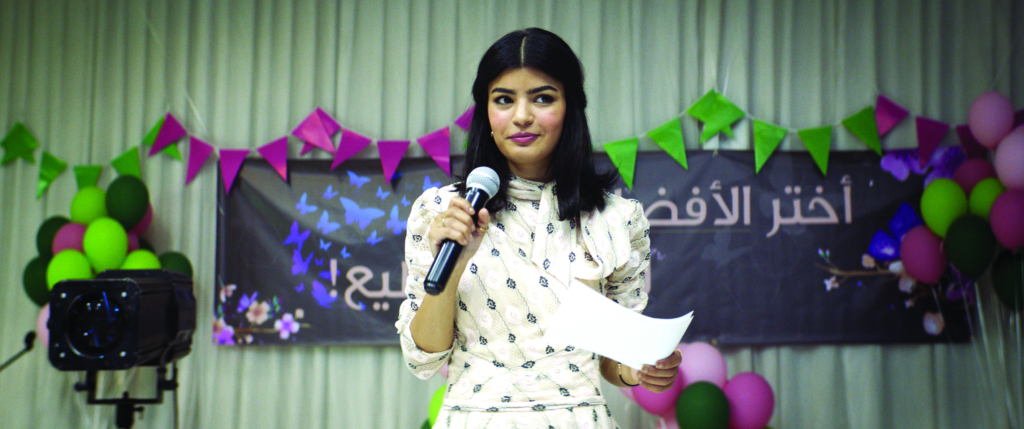
Al Mansour is, herself, a Saudi woman of liberal values who went abroad. After her landmark feature debut, Wadjda (2012), became the first ever feature film shot in the kingdom, its international success landed her directing gigs on film shoots in Europe (2017’s boilerplate biopic Mary Shelley) and the US (2018’s hair-themed Netflix rom-com Nappily Ever After). The Perfect Candidate found her back in her homeland, wanting to make a film in, and about, its less restrictive cultural climate. After Wadjda was made partially in secret (‘It was incredibly difficult to make a film in 2011, and people were still very hesitant to embrace any public form of artistic expression,’ she recounts. ‘Film was seen as especially taboo’[9]Haifaa Al Mansour, quoted in Laura Berger, ‘BFI London FF 2019 Women Directors: Meet Haifaa Al Mansour – The Perfect Candidate’, Women and Hollywood, 14 October 2019, <https://womenandhollywood.com/bfi-london-ff-2019-women-directors-meet-haifaa-al-mansour-the-perfect-candidate/>, accessed 19 May 2021.), The Perfect Candidate was co-funded by the state, an officially authorised film from a country that, until 2017, had effectively outlawed cinemas.[10]See Katie Paul, ‘Saudi Arabia Lifts Cinema Ban, Directors and Movie Chains Rejoice’, Reuters, 11 December 2017, <https://www.reuters.com/article/us-saudi-film-idUSKBN1E50N1>, accessed 19 May 2021.
Al Mansour came to filmmaking when, after her studies, she was ‘working for an oil company in Saudi’ and ‘felt invisible’ due to the male colleagues who’d ‘completely ignore’ her.[11]Al Mansour, quoted in Berger, op. cit. She started making short films as a hobby, a way of expressing her silenced voice. When her 2005 documentary Women Without Shadows (about the ‘secret lives’ of Saudi women) afforded her the opportunity to travel internationally and subsequently caused controversy back home, she says that she ‘realized the true power of film’.[12]ibid.
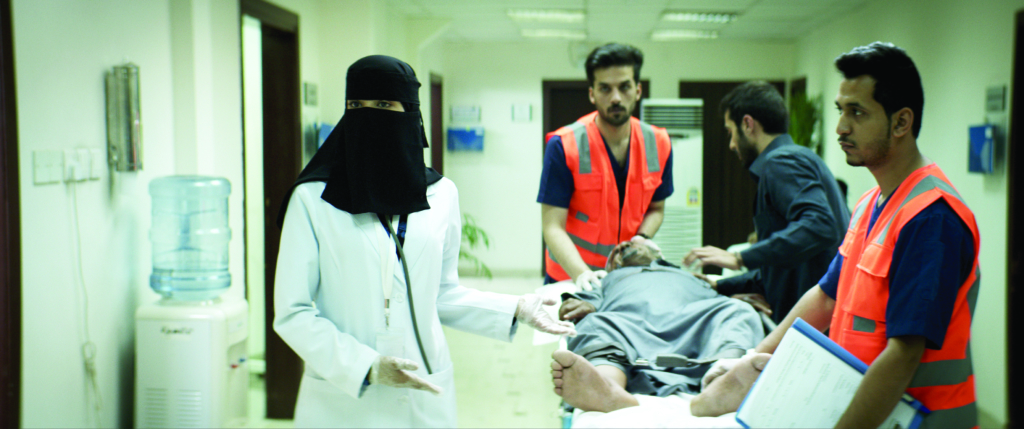
The Perfect Candidate is an attempt to leverage that power, familiar in the universality of its ‘message movie’ ways, but unfamiliar in terms of the rarely-seen-on-screen culture it depicts (‘When you make an American or a British film, you really have to stand out,’ Al Mansour admits, ‘[whereas] Saudi Arabia is an exotic place; there are not a lot of movies coming from there’[13]Haifaa Al Mansour, quoted in Kaleem Aftab, ‘Haifaa al Mansour • Director of The Perfect Candidate’, Cineuropa, 6 September 2019, <https://cineuropa.org/en/interview/377804/>, accessed 19 May 2021.). Part of the reason for making the film, its director says, was ‘hoping that women [who see it] will be inspired to change their situation within the family, within their workplace, with them taking actual steps to be happy’.[14]Al Mansour, quoted in Garcia-Navarro, op. cit. Countering that big-picture ambition is a far more personal current that runs through The Perfect Candidate. Al Mansour came from an artistic family (her father was a poet; her mother, a singer), something not regarded as noble in recent Saudi history – and the exploration of these ideas, of fictional and authorial familial histories, resides at the heart of the film. Maryam’s unexpected political campaign isn’t just a symbol of social change, but a narrative device that shines a light on familial dynamics, brings up old histories and causes relationships to change and grow.
The Perfect Candidate shows how things are never simple, nor linear, and how undoing the most problematic elements of Saudi society will take time, be the work of a generation.
At the centre of Al Mansour’s film are three sisters – serious Maryam, ultra-sarcastic event planner / wedding photographer Selma (Dae Al Hilali, who is credited under her ‘influencer’ handle Dhay) and pious younger sibling Sara (Nora Al Awad) – who are left alone when their father, the musician and music teacher Abdulaziz (Khalid Abdulraheem), goes off on a three-week tour. Whereas Maryam is foiled in her attempts to fly to Dubai by old patriarchal edicts (laws that were finally eased in 2019[15]See ‘Saudi Arabia Allows Women to Travel Independently’, BBC News, 2 August 2019, <https://www.bbc.com/news/world-middle-east-49201019>, accessed 19 May 2021.), her DIY campaign is entirely conceived of and implemented by these three young women. She prints out an online guide, ‘10 Steps to Running a Political Campaign’, and recruits tech-savvy Selma to help her make a campaign video. Her plans to go into the public realm, though, bring up the ghost of their recently departed mother – a singer who is never seen, but lingers throughout in spirit and swapped anecdotes. During the sisters’ youth, their mother suffered ‘all that gossip and name-calling’ for merely having been a singer during a particularly conservative period; both straitlaced Maryam and moralising Sara felt genuine shame about their mother’s profession. In a confessional rooftop exchange with Selma on the eve of her candidacy, Maryam recounts how embarrassed she felt being brought up to sing with her parents at family gatherings. Her dramatic arc finds her needing to atone for those feelings and make amends to the spirit of her departed mother, which she does first by stepping onto the political stage, then by taking the literal stage to sing at a wedding in a final, climactic scene.
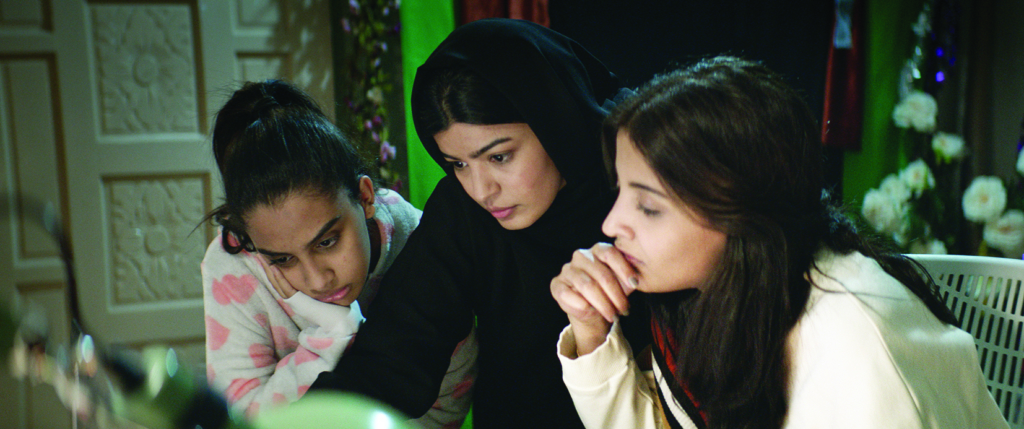
The Perfect Candidate’s B story – which takes up an unexpected amount of screen time – fully explores the place of music in Saudi Arabia, following Abdulaziz and his band of traditional musicians (all of whom, Abdulraheem included, are musicians with no acting experience[16]Smith, op. cit.) on their tour around the kingdom. We see them on the road, in an unglamorous tour bus, performing to crowds that often vary between barely there and barely interested. One gig finds a bomb squad checking all vehicles at the entry gates after extremists have made threats about the performance, a holdover from darker days. But now the show must go on, especially as the State is assembling an official national band, and the long-suffering musicians all want to showcase their skills. ‘Threats are nothing new,’ says one band member. ‘What’s new is that now there is support for musicians.’ This is Al Mansour’s essential reason for devoting so much screen time to this storyline: this traditional band symbolises both Saudi cultural history and changing social views on musicians in recent years. ‘I also wanted […] to celebrate the strong artistic and cultural legacy of Saudi Arabia and tell a story that stresses how important it is that we build upon those traditions as the foundation for our societies’ development,’ she says.
So much of our music, theater, stories, and all forms of artistic expression were almost erased from our culture entirely, so I felt like we needed a story that reminded people of the strong artistic traditions we have, and how they can help us as we move forward into an exciting future.[17]Al Mansour, quoted in Berger, op. cit.
Even though Maryam’s father is an artist and affords his strong-willed daughters great freedoms, he’s still an old patriarch (he thinks it’s high time his two elder daughters were married, for starters), and his entrenched resistance to Maryam’s campaign carries due symbolic weight. Whereas many of the younger men she encounters – from cousin Rashid to almost love interest Omar (Tareq Ahmed Al-Khaldi) – are supportive of her desire to run for municipal office, Dad is a nonbeliever from the start. ‘My daughter acts like a lion at home, but in public, she’s more like a mouse,’ he says, dismissively, when first encountering her campaign video. When bandmates ask about his family, he sighs things like ‘those girls will be the death of me’ and ‘don’t remind me, it makes my blood pressure spike’. When Maryam asks him to speak to local men at a campaign event – it is still illegal for her to address a male crowd directly – he refuses to help out with her ‘crazy campaign’. Instead, Omar lends a hand, roping in a tent full of men to hear her speak via video hook-up. When the crowd turns out to be full of old trolls and moralisers who’ve come to shout her down and the video link fails, Maryam throws old edicts to the wind, storming the tent and speaking to them directly. ‘I’m a candidate, and candidates deserve respect – male or female!’ she yells. ‘I wanted to start a dialogue on an important issue. I’m from this town; if you won’t support me, who will you support?’ Maryam’s rant is recorded on a phone by an onlooker, and again goes viral; when her dad sees it, he feels guilty, lamenting that he should’ve been there to help and support her. But when he gets home from the tour (having won a gig on the new national band along the way) and apologises to her – saying, proudly, in reference to his late wife, that his daughter ‘inherited her stubbornness, her strength’ – Maryam pushes back, saying that his absence taught her to solve her own problems, be her own advocate. Her election bid eventually, inevitably fails, but it’s not a lost cause: she captures a decent percentage of the votes and inspires young women to dream big, and her public agitation gets the road outside the hospital paved.
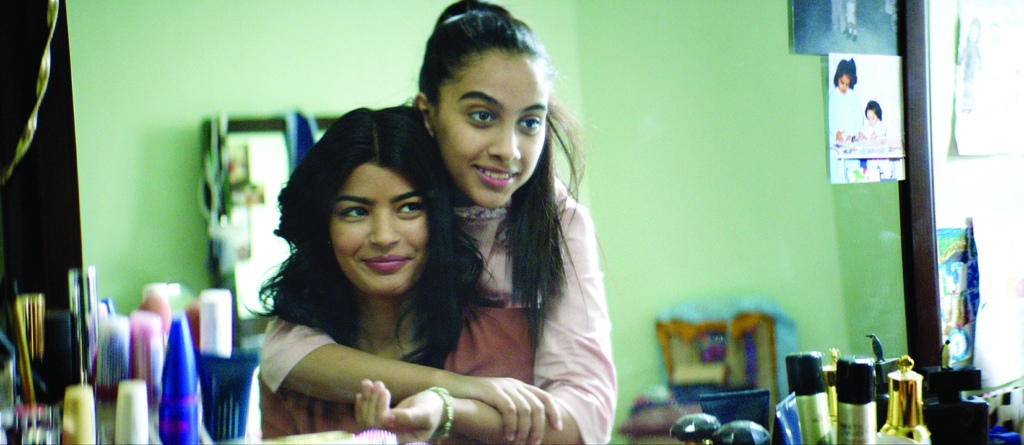
For Al Mansour, this narrative communicates the complexity of social change. There are no heroes or villains in her story; instead, The Perfect Candidate shows how things are never simple, nor linear, and how undoing the most problematic elements of Saudi society will take time, be the work of a generation. ‘It is not like men versus women; that is not the story. It is everybody against a system that is marginalising,’ she offers. ‘Men are forced to take care of women. They are all tied to the same place, and whatever they think or do is dictated by similar ideas circulating in the society.’[18]Al Mansour, quoted in Smith, op. cit. The director sees art – be it the musicians she chronicles on screen, or the film itself – as a huge catalyst for social change. ‘It’s amazing to bring art to very conservative societies,’ she forwards. ‘Change becomes more fundamental and more real. It might take time for people to understand and value but that elevates it. That is how civilisation is built.’[19]ibid.
Endnotes
| 1 | Haifaa Al Mansour, quoted in Orla Smith, ‘TIFF Interview: Haifaa Al-Mansour on Her Political Crowdpleaser, The Perfect Candidate’, Seventh Row, 27 September 2019, <https://seventh-row.com/2019/09/27/haifaa-al-mansour-perfect-candidate/>, accessed 19 May 2021. |
|---|---|
| 2 | See Tamara Keith, ‘Sexism Is Out in the Open in the 2016 Campaign. That May Have Been Inevitable’, NPR, 23 October 2016, <https://www.npr.org/2016/10/23/498878356/sexism-is-out-in-the-open-in-the-2016-campaign-that-may-have-been-inevitable>, accessed 19 May 2021. |
| 3 | See Steph Harmon & Amaani Siddeek, ‘“It Took On a Life of Its Own”: The Story Behind Julia Gillard’s Misogyny Speech’, The Guardian, 7 February 2020, <https://www.theguardian.com/tv-and-radio/2020/feb/07/it-took-on-a-life-of-its-own-the-story-behind-julia-gillards-misogyny-speech>, accessed 19 May 2021. |
| 4 | Al Mansour, quoted in Smith, op. cit. |
| 5 | ibid. |
| 6 | Haifaa Al Mansour, quoted in Melanie Goodfellow, ‘Haifaa Al Mansour on Returning Home to Saudi Arabia to Shoot TIFF Title A Perfect Candidate’, Screen Daily, 13 September 2019, <https://www.screendaily.com/features/haifaa-al-mansour-on-returning-home-to-saudi-arabia-to-shoot-tiff-title-a-perfect-candidate/5142835.article>, accessed 19 May 2021. |
| 7 | Haifaa Al Mansour, in ‘Haifaa al-Mansour on The Perfect Candidate | BFI Q&A’, 27 March 2020, <https://youtu.be/56eYVuu5KSE>, accessed 19 May 2021. |
| 8 | Haifaa Al Mansour, quoted in Lulu Garcia-Navarro, ‘The Perfect Candidate Sees a Saudi Doctor Driving Change’, NPR, 9 May 2021, <https://www.npr.org/2021/05/09/995173001/the-perfect-candidate-sees-a-saudi-doctor-driving-change>, accessed 19 May 2021. |
| 9 | Haifaa Al Mansour, quoted in Laura Berger, ‘BFI London FF 2019 Women Directors: Meet Haifaa Al Mansour – The Perfect Candidate’, Women and Hollywood, 14 October 2019, <https://womenandhollywood.com/bfi-london-ff-2019-women-directors-meet-haifaa-al-mansour-the-perfect-candidate/>, accessed 19 May 2021. |
| 10 | See Katie Paul, ‘Saudi Arabia Lifts Cinema Ban, Directors and Movie Chains Rejoice’, Reuters, 11 December 2017, <https://www.reuters.com/article/us-saudi-film-idUSKBN1E50N1>, accessed 19 May 2021. |
| 11 | Al Mansour, quoted in Berger, op. cit. |
| 12 | ibid. |
| 13 | Haifaa Al Mansour, quoted in Kaleem Aftab, ‘Haifaa al Mansour • Director of The Perfect Candidate’, Cineuropa, 6 September 2019, <https://cineuropa.org/en/interview/377804/>, accessed 19 May 2021. |
| 14 | Al Mansour, quoted in Garcia-Navarro, op. cit. |
| 15 | See ‘Saudi Arabia Allows Women to Travel Independently’, BBC News, 2 August 2019, <https://www.bbc.com/news/world-middle-east-49201019>, accessed 19 May 2021. |
| 16 | Smith, op. cit. |
| 17 | Al Mansour, quoted in Berger, op. cit. |
| 18 | Al Mansour, quoted in Smith, op. cit. |
| 19 | ibid. |

